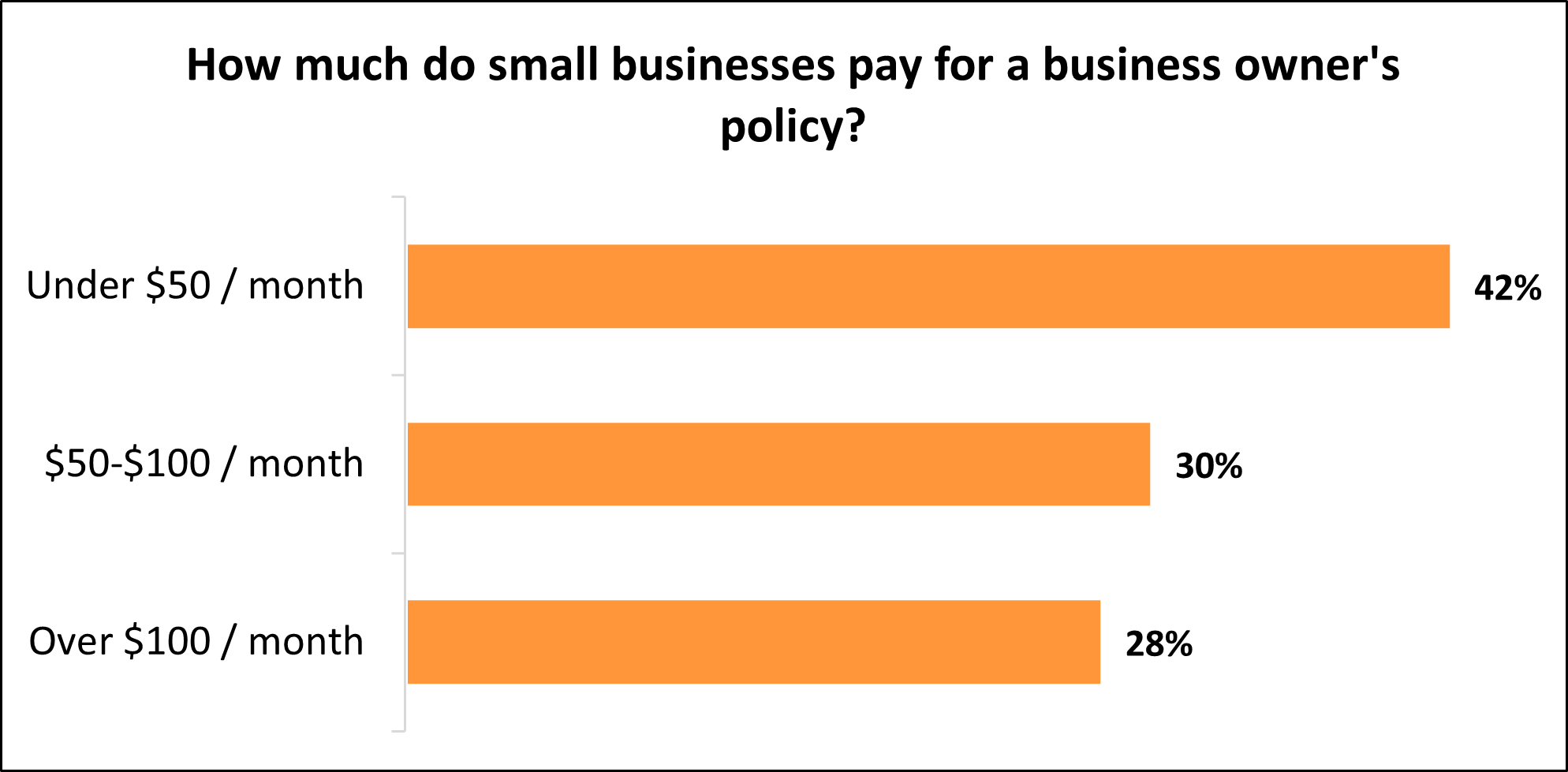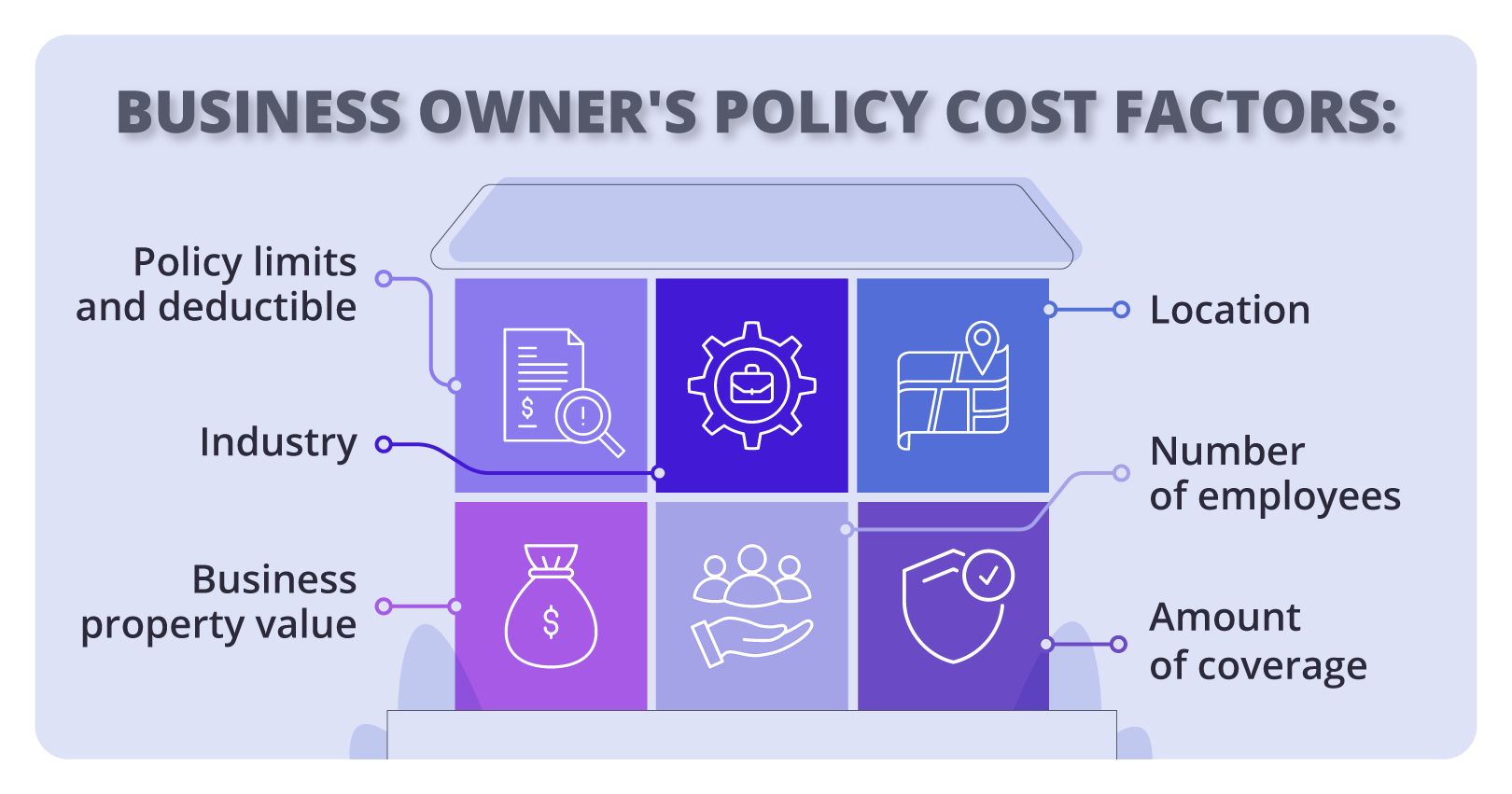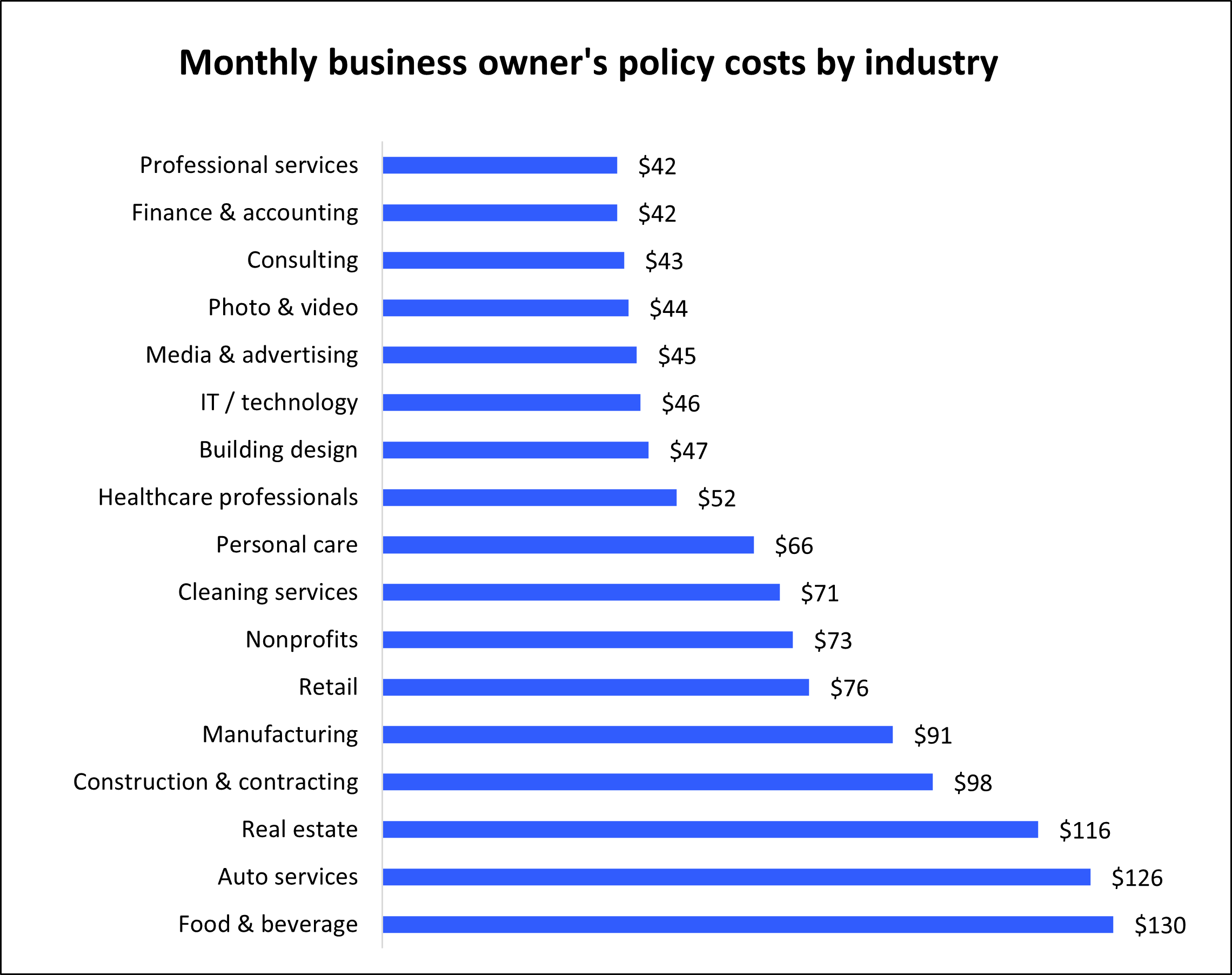
Business owner’s policy cost
A business owner's policy (BOP) bundles general liability insurance and commercial property insurance, usually at a lower cost than if you purchased these policies separately. BOP premiums are calculated based on the policy limits you choose, business property value, and more.
What is the average cost of a BOP?
Small businesses pay an average of $57 per month for a business owner’s policy, or about $684 annually.
Our figures are sourced from the average cost of policies purchased by Insureon customers.
Typical business owner's policy costs for Insureon customers
Among Insureon's small business customers, 42% pay less than $50 per month for a business owner's policy, and another 30% pay between $50 and $100.
The cost varies for small businesses depending on their risks, the value of their business property, and the amount of coverage they choose.

How is a business owner's policy cost calculated?
Your insurance provider calculates your BOP insurance premium based on a number of factors, including:
- Location of your business
- Your coverage limits and deductible
- Number of employees
- Business property value
- Industry and risk factors
Chat with a licensed insurance agent if you're unsure about your business owner's policy insurance options or to receive free quotes.

Business location
Your business location is one of the factors that can determine how much you'll pay for a BOP. Different states have different BOP insurance cost averages.
Location can impact your costs for a few reasons.
First, certain states have business insurance requirements, which can determine the amount of insurance a business must carry.
Second, some cities, states, and regions face higher risks than other areas. These risks can include crime, natural disaster frequency, and environmental hazards. When a location has higher risk, business insurance policies often cost more.
It is often not readily available how each commercial insurance company calculates its premiums. However, we do have some averages available based on Insureon data.
BOP policy averages for Insureon customers by state include:
| State | Business owner's policy cost |
|---|---|
$59 | |
$76 | |
$66 | |
$58 | |
$72 | |
$84 | |
$75 | |
$54 | |
$62 | |
$73 |
Find business insurance requirements in your state

Policy limits and deductible
If you want car insurance that pays for a wide range of damage, you have to pay more for it. The same rule applies to business insurance.
A policy with higher liability coverage limits would cost more in premiums, but reduce your out-of-pocket costs during a claim, regardless of the type of coverage you need.
The most popular business owner’s policy among Insureon customers is the $1 million / $2 million policy. This includes:
- $1 million per-occurrence limit. While the policy is active, the insurer will pay up to $1 million to cover claims related to a single incident.
- $2 million aggregate limit. During the lifetime of a policy (usually one year), the insurer will pay up to $2 million to cover claims.
The majority of Insureon customers (87%) choose a policy with a $1 million per-occurrence limit and a $2 million aggregate limit. Ten percent of our customers choose a policy with $2 million / $4 million limits, the next most popular choice.
Insureon customers typically choose a deductible of about $500 for a business owner's policy. You can choose a higher deductible to save money on your premium. However, it should be an amount you can easily afford, as you can't benefit from your insurance without first paying the deductible on a claim.
Number of employees
Generally speaking, the more employees you have, the more you'll need to pay for insurance.
With increased employees, your business has an increased risk of incidents or lawsuits.
Even single-employee businesses, such as sole proprietors, independent contractors, and freelancers, should consider a BOP to protect them from the high costs of lawsuits and medical expenses.
Property value
For the commercial property insurance portion of a BOP, the cost of insurance depends on the value of your business property, its location, and how you choose to protect it.
These are the main factors that determine the cost of property insurance included in a BOP:
Business personal property (BPP) value. To protect your property, the first step is knowing what it’s worth. You'll need an estimate of your business personal property. The amount will help you determine appropriate limits to make sure you have enough property coverage to pay for stolen, damaged, or destroyed items.
Replacement value versus actual cash value. The cost of a BOP varies depending on how you choose to insure your business personal property. You can insure it for its replacement value (cost when new), or save money by insuring it for its actual cash value (depreciated value).
Location and age. The value of your building and subsequent insurance costs vary dramatically depending on where your business is located. For example, a small retail shop in rural Pennsylvania would cost much less to insure than a similar retail shop in urban California. Old buildings may also incur higher insurance rates as they are more susceptible to damage.
Endorsements. Additional coverages can expand the protection of a BOP at an increased cost. Business interruption insurance covers lost business income due to a temporary closure, while equipment breakdown insurance covers equipment that suffers a mechanical failure. Check with an agent to find out what your policy includes.
While a business owner's policy is recommended for most small businesses, it doesn't protect against every risk. For example, most states require by law that small business owners carry workers' comp if they have employees, and commercial auto insurance if they have business-owned vehicles.
Industry
For the general liability insurance portion of a BOP, your industry and the number of employees have a significant impact on policy costs.
Generally, high-risk industries, such as retailers with a storefront, pay higher premiums, while low-risk industries enjoy lower rates.
For example, a high-volume pharmacy is exposed to more risk of customer bodily injuries than an IT consultant who works remotely from a home office.
Construction businesses, auto services, and retail stores also have high coverage costs because these industries often have valuable equipment or inventory, as well as an increased chance of a third-party liability claim.
The graph below illustrates how the type of business affects what you'll pay for a business owner's policy.

Top industries we insure
Don't see your industry? Don't worry. We insure most businesses.
Does my business need a business owner's policy?
A business owner's policy is a must-have for small businesses that interact with customers and own business property.
At any business, a visitor could trip and suffer a bodily injury. If the visitor sues, legal costs can escalate to the point where they could sink your business.
Even if no one outside your company visits your office, someone could still hold your business liable for damages. For example, businesses that run advertising campaigns or post on social media could face a lawsuit if they post content that doesn't belong to them, or make a false claim about a competitor.
When someone sues your business – even if it's a frivolous lawsuit – you'll have to pay legal defense costs, such as the cost of hiring an attorney. If you lose the suit, you could end up paying a fortune in a court-ordered judgment or a settlement.
A general liability policy covers all of these costs, which could save your business from bankruptcy. Commercial property insurance covers your building, computers, equipment, tools, and furniture in the event of theft, storm damage, or a fire. A business owner's policy includes both, safeguarding your business against the most common lawsuits and losses.
Because the premium is based upon your level of risk and the value of your business property, small businesses and contractors often pay only a small monthly premium for a BOP.
How can you save money on a BOP?
There are a few steps you can take to help reduce your BOP premium and avoid more expensive rates:
Pay your entire premium upfront. Your business owner’s policy premium can typically be paid in monthly or annual installments.
It might be tempting to go with a smaller monthly payment, but consider paying the full premium. Many insurers offer a discount when the annual premium is paid in full.
Proactively manage your risks. If your small business has no claims history, expect to pay lower insurance rates. An effective way to do this is to create a comprehensive risk management plan. For example, you might:
- Develop a thorough training program for employees
- Invest in a security system
- Compile rules for posting to social media
- Create procedure checklists and reviews
- Minimize hazards on your premises
Strategically select your office location. Picking safer areas with a lower possibility of property damage can help you save money on the cost of small business insurance.
Opt for an actual cash value policy. An actual cash value policy, compared to a replacement value policy, means you'll be insuring your property at its used cost rather than a full new replacement cost. Actual cash value policies keep your premiums lower, though you will get less for your property should there be a claim.
Why do small businesses choose Insureon?
Insureon is the #1 independent agency for online delivery of small business insurance. We help business owners get quotes from top-rated U.S. insurance providers, pick the right coverage for their insurance needs, buy policies, and manage coverage online.
By completing Insureon’s easy online application today, you can get free business insurance quotes for all types of commercial insurance policies.
You can also speak with an insurance agent about the insurance coverage options your business needs to protect it from financial losses.
Once you find the right small business insurance policies for your needs, you can begin coverage in less than 24 hours and get a certificate of insurance as proof of coverage.
Verified BOP coverage reviews
Learn more about business insurance costs
Don't see your profession? Don't worry. We insure most businesses.













